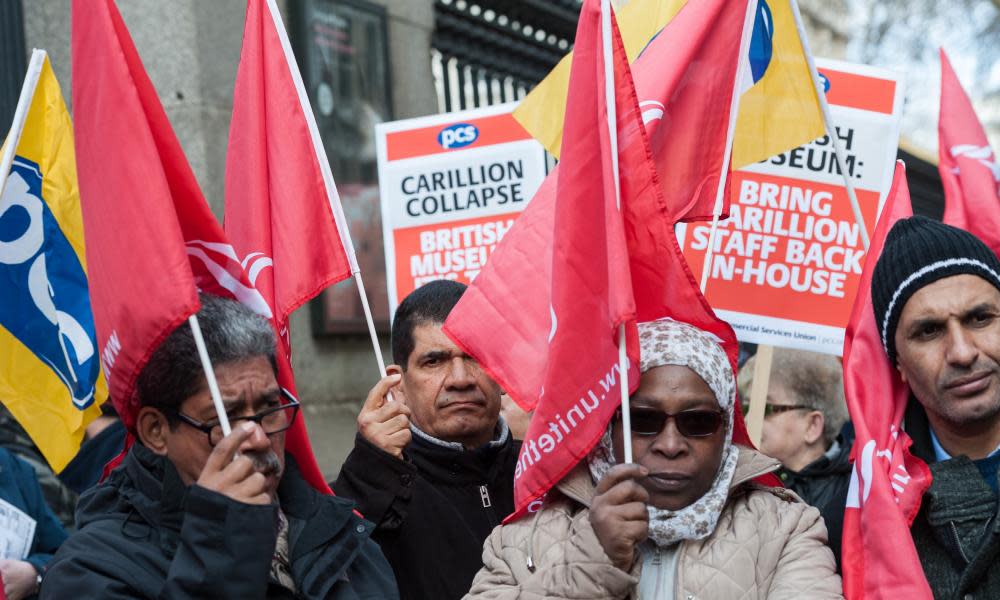Carillion fiasco shows why auditors must be accountable to parliament

Last week’s verdict from a parliamentary committee on the collapse of construction and outsourcing company Carillion – “recklessness, hubris and greed” – marks the failure not just of a model for providing public services but of the system by which the businesses we all rely on are kept financially honest.
Some of the MPs’ strongest words were reserved for the accountants that should have acted as the company’s financial watchdogs. The auditors from KPMG, earning around £1.5m a year for vouching that Carillion’s accounts gave a “true and fair view” of its business, were in fact rubber-stamping figures that “misrepresented the reality of the business”. In March 2017, the firm expressed no concern over reported profits of £150m even though just four months later these proved to be illusory.
Nobody says accounting is easy. Estimating profits and losses on long-term contracts before they finish, for example, involves fine judgment. But this should be exercised by managers and auditors with “professional scepticism”, a principle as critical to sound accounting as the Hippocratic oath is to medicine. Instead, said the MPs, “in failing to exercise – and voice – professional scepticism towards Carillion’s aggressive accounting judgments, KPMG was complicit in them”.
This failure, which included “accounting for revenue for work that [had] not even been agreed”, enabled Carillion to present the healthy results that justified the lavish dividends and boardroom bonuses that drove the company into insolvency. It also meant that the firm could win more work, often with the taxpayer on the other end of a doomed contract.
At the same time the combined deficits of its pension schemes, starved of contributions, grew to £2.6bn. Here, too, the hand of the accountants was to be seen. For five years up to 2017, Britain’s largest accountancy firm, PricewaterhouseCoopers, had acted as the company’s pensions consultant, earning £2.9m. Over this period, Carillion’s priorities turned away from honouring its obligations to its workers. Then last year, PwC flipped sides and began advising the pension scheme trustees on how to deal with the Carillion board.
So many are the accountants’ conflicts of interest and so limited the choice of firms for large pieces of work, however, that when the company collapsed in January the same PwC landed the job as government-appointed special manager, “re-emerging”, in the words of inquiry co-chairman Frank Field MP, “as butcher, packaging up joints of the fallen beast to be flogged off”.
For some time now, the “big four” accountancy firms – KMPG, PwC, Deloitte and EY – have put their own finances above guarding their clients. In the UK, they now earn less than a quarter of their income from the once core task of auditing. (At Deloitte – the Carillion internal auditor that “failed in its risk management and financial controls role” – the figure last year was 14%). The rest comes from consulting on everything from reorganising the NHS to cyber-security. While there are limits on how much consultancy can be performed for an audit client, this imbalance distorts incentives. All the firms earn nine-figure sums annually from the public sector, much involving the outsourcing of public services, plus even more from the companies such as Carillion that benefit. The incentive not to blow the whistle on a flawed business model is obvious.
The big four now style themselves “professional services” firms, cashing in on the contacts and insight that come from their stranglehold on the market; they now audit 97% of Britain’s top 350 listed companies. Their senior partners, none of whom made their careers in the unsexy auditing arms of their firms, target fee income rather than financial probity. The commanding heights of business are audited by outfits that are no longer accountancy firms. This major and still under-appreciated fault line through the world economy guarantees future financial earthquakes.
The danger is no longer a new one. The financial crisis a decade ago began and intensified through flawed accounting, as, first, US sub-prime lenders and, then, mainstream banks polluted their balance sheets without auditors raising any objections. A parliamentary committee concluded that “the complacency of the bank auditors was a significant contributory factor” in causing the crash.
The accountancy profession emerged two centuries ago to rein in the financial excesses of the Industrial Revolution. In the second half of the 20th century, it became the servant of the masters of capitalism. Just weeks after Carillion collapsed, KPMG senior partner Bill Michael told one interviewer that his firm had “moved from what we do to clients to what we do with clients”.
Cosying-up rather than confronting lies at the heart of the Carillion affair. Good auditing can involve telling some important emperors, such as the directors of banks or companies on which swaths of public services depend, that they have no clothes. If economies like the UK’s are not to veer from one crisis to another, and if vital services are not to be placed at the mercy of financially unsound companies, auditing must be objective and fearless.
This requires real reform, beyond merely breaking up the big four. Most importantly, it is time for systemically important banks and service providers to be audited by a public body – answerable to parliament – that is motivated by the public interest rather than fee generation. The watchdogs of capitalism can’t also be its supplicants.
• Richard Brooks is the author of Bean Counters: The Triumph of the Accountants and How They Broke Capitalism, published by Atlantic Books on 7 June

 Yahoo News
Yahoo News 
